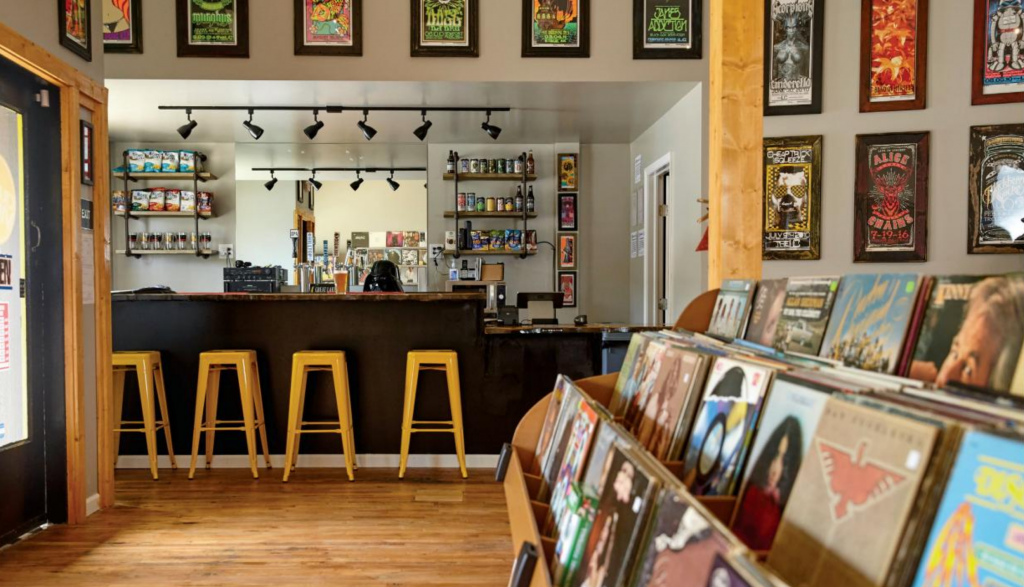Originally published in the June 2020 issue of (614) Magazine

Columbus has always been a creative crossroads, an intersection of ideas. When Troy Stacy opened his unlikely convergence of a record shop, impromptu studio, and craft beer counter, it already seemed like too much to squeeze under one roof.
Yet in less than two years, the long-shuttered hardware store in Grandview has also become a credible concert venue for up-and-coming artists, added an expanded menu of musically-inspired paninis, and even published a book to parallel their famous pairings of classic albums with beers that best suit them. Call it foresight or fate, the inclusive name Craft & Vinyl seems more apropos with each new endeavor.
“The initial idea was to bring together vinyl collectors, music makers, and craft beer lovers, but we didn’t really anticipate bands knocking on the door and asking if they could play gigs here,” revealed Stacy. “The fact that someone would walk into our little space and want to bring their energy and creativity to our environment, I certainly invited it, but it took us a couple of months before we had the opportunity to build the stage, sound, and lighting they deserved.”
Emerging acts often struggle to book shows unless they know the right folks or have members connected to groups that are already established. The gap between garage gigs and even a basement bar can be daunting, especially for those focused exclusively on their own songs.
“It’s really challenging to get those first gigs, even more challenging if an artist or band is all about original music. That’s something that I love, music I’ve never heard before,” he explained. “There are a lot of great bands in our community who can bang out a cover and nail it. But I wanted to invite artists into this space and give them a platform to share music no one knows, an opportunity to engage audiences with something new.”
That enviable momentum came to a screeching halt in mid March, and like every small business, essential or otherwise, the labyrinth of government programs offered more dashed hopes than promised relief. Like most folks in the music scene, his passion was preceded by a less glamorous gig, in his case the insurance industry. So when Stacy started his business in 2018, his insights for finding the right coverage were formidable, and the fight now looming with his insurance company could impact small businesses across the country also trying to recover.
“We reached out to our insurer, Cincinnati Insurance, and our policy is in good standing. I have always paid my premiums,” Stacy stated, noting his coverage specifically includes losses incurred due to “prohibited access to the premises by civil authority”. “In fact days after they denied my claim, they sent me another premium notice. ‘Hey, don’t forget to pay your bill, dude.’ I felt betrayed.”
Point of fact, most commercial policies specifically exclude pandemics for a reason. More than a decade ago in the wake of the SARS epidemic, the industry lobbied Congress about the threat such losses could pose, crafting language to prevent claims during a crisis just like the one businesses face right now amid mandatory closures.
“My attorney said first of all, right off the riff, we know this is going to impact more than a hundred businesses. We anticipate it’s going to affect thousands nationally, and we filed it in federal court,” he explained. “If the case proceeds as a class action, Cincinnati Insurance will have to open up their books to the courts and disclose every single policy holder that has a policy like mine.”
Stacy is hardly alone in this fight. Even before seeking legal representation, he reviewed his policy’s fine print with former colleagues still in the insurance industry. The lack of exclusionary language seems to be an oversight, but a costly one that could serve as a legal precedent. Cincinnati Insurance Company covers numerous notable businesses in Ohio, but similar suits, raised mostly by restaurants, are also advancing in Louisiana and California. Wolfgang Puck is probably the most famous plaintiff so far, and even the White House has weighed in that if policies failed to exclude pandemics, then claims should be covered.
“The denial letter had things in it that I never even discussed or claimed. That’s when I knew they were putting me off, putting all claimants off, as they try to figure out what to do because they didn’t write their policies properly,” Stacy revealed. “They’re still out there taking money. I’m not sure what’s going to come of this, and I hope other businesses with policies like mine join the class action. At least now, Cincinnati Insurance knows my name, and I’m not alone.”
Legal maneuvering and loss of business aside, what bothers Stacy most is still the loss of community. Local bands aren’t the only beneficiaries of his small stage. Students from Capital University Conservatory of Music and Groove U present their capstone projects there, and School of Rock uses their space for recitals. He even offers studio time to students who wouldn’t be able to afford it otherwise. Craft & Vinyl is committed to inspiring the next generation of musicians, now entering an industry where the future remains very uncertain.
“We’ve built a Facebook following, but it’s never been about making money as much as keeping customers engaged. It helps promote bands, and new music, and events like PickTown Palooza or our partnership with PromoWest that don’t necessarily happen at Craft & Vinyl, but exist in our universe,” he noted. “It keeps us connected, but it’s not the same. I miss the bands on my stage, the conversations at the bar. I miss the music, but I miss the people most. We all do, and we can’t wait to see each other again.” ▩
For more on Craft & VinyI, and to reserve your copy of Pour and Play, visit craft-n-vinyl.com